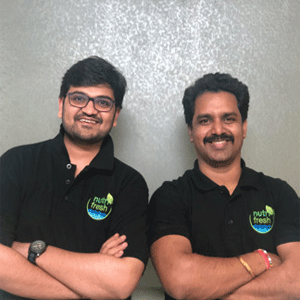
As a farming technique, Hydroponics has been gaining a lot of impetus in the Indian market lately. Hydroponics uses 90 percent less water, and it also generates more yield than traditional farming. In any farming, the three necessary ingredients are air, water, and soil. And, unlike traditional farming methods that procure water from borewells, rivers, or dams, Hydroponic farming is often done in a confined enclosure where RO water is strictly used. This way, the produce is free of contaminants that get assimilated from the water sources used in traditional farming.
Additionally, anyone using harmful fertilizers is polluting the soil. For generations, farmers have been putting chemicals into our soil and water deposits. They get deposited under the soil, and later the roots of the plants take in the contaminated nutrients present in the soil. Sadly, all the polluting nutrients end up in our food chain. Hydroponic farming avoids this problem altogether by using alternative mediums to the soil that are Ph neutral such as Coco-peat, Perlite & Clay Pebbles or directly Nutrient Rich Water, to name a few. Hydroponic is ideal for urban areas that have narrow and confined spaces. However, the best part of Hydroponic is that the produce (fruits, vegetables, and herbs) is much fresher and can be grown throughout the year.
In the last five years, the Hydroponic segment in India has grown drastically from just 3-4 such
farms to well over 100s. One such startup that has been taking giant strides in the Hydroponic domain is Pune -based Nutrifresh. With a farming facility spread across 10 Acres, the startup is today India’s largest Hydroponic producer. Nutrifresh is also the only ISO, FSSAI, APEDA and HACCP-certified player in this new Hydroponic market of India. It is also following Global GAP (Good Agriculture Practices) Norms.
Nutrifresh produces more than 42 different products bifurcated which are Residue Free Produce into four major categories of fruity vegetables, leafy vegetables, fruits, and herbs through hydroponic farming. This includes fruity vegetables such as Bell Peppers, Cherry Tomatoes, Zucchinis, Seedless Cucumbers, Broccolis, various types of Leafy Vegetables like Lettuces, Spinach, Baby Spinach, Fenugreek, Coriander, Mint, Celery, Parsley and Mustard Green. Nutrifresh also produces exotic foreign breeds, including Kale and Arugula, along with a host of exotic herbs, including Lemongrass, Rosemary, Oregano, Thyme and much more.
Nutrifresh produces more than 42 different Residue Free Produce bifurcated into four major categories of fruity vegetables, leafy vegetables, fruits, and herbs through hydroponic farming
The Growth journey and Beyond
The journey of Nutrifresh began with an encounter between two white-collared professionals Sanket Mehta and Ganesh Nikam, both working in the Financial sector. The duo met at a bank and immediately struck a friendship. Both were fitness freaks, having a shared passion for agriculture, and were equally distressed about the degenerating quality of food available in the market. This led to the Agriprenuers taking matters into their own hands, which eventually led to the conception of Nutrifresh with the simple intention of producing Hydroponically produced fresh food. The white-collared turned Agripreneurs Sanket, and Ganesh had a humble upstart, beginning with a sugarcane project. Over the past one and a half years, the duo has transformed Nutrifresh into one of the biggest Hydroponic producers of India.
Operating primarily on a B2C model, Nutrifresh today supplies its produce on a Pan-India basis, with popular demands reaching as far as Singapore in the International market. The startup is also supplying its products to over 100 plus B2B aggregators in the Indian market and Modern Trade Delivery Partners like Big Basket, Swiggy Instamart, Vista Foods (McDonalds), Supr Daily and Zomato. And, for the long run, the duo is on a mission to be the biggest grower of Hydroponic produce in India.
We use cookies to ensure you get the best experience on our website. Read more...